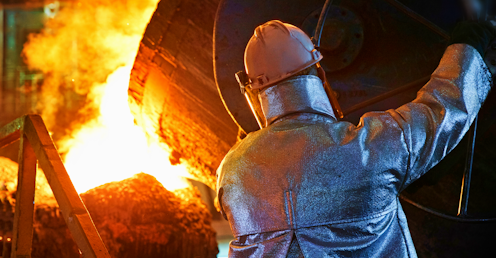Australia won’t have ‘green steel’ to itself. Africa is poised to become a global hub
- Written by Charlie Huang, Co-leader, Sustainable Global Business Operations and Development Research Group, School of Management, RMIT University

Australia is at the forefront of efforts to turn steelmaking green.
Earlier this year Australian iron ore producers Rio Tinto teamed up with Australian steelmaker BlueScope to develop “near-zero emission-intensity[1]” pathways for making steel from Pilbara iron ore.
Renewable electricity and hydrogen would replace coking coal.
Iron ore miner Fortescue[2] and a company started by two former[3] Fortescue executives are developing plans to make low-emissions iron using competing technologies.
But Australia, the world’s biggest iron ore exporter[4], won’t have the field to itself.
Africa, a continent with boundless high-quality iron ore, is poised to become one of the world’s biggest producers of low-emissions steel, rivalling China[5].
Africa is blessed with sun, wind, iron ore of the necessary quality, and (importantly) a domestic demand for steel set to grow ten-fold.
Green steel is difficult
Global green steel production emits 2.8 billion tonnes of carbon dioxide per year, about 8% of global energy emissions[6], or 10% when emissions from the electricity used to make steel are included.
While it is possible to make steel in ways that don’t emit carbon, replacing thermal coal with zero-emissions electricity, and coking coal with electricity and hydrogen, it is expensive and may not be commercial until the 1930s[7].
Management consultant McKinsey & Company believes green steel is unlikely to be cost-competitive with traditional steel manufacture backed by carbon capture and storage until 2050[8].
One of the reasons green steel would be expensive to make at scale is that it requires so-called green hydrogen. Although hydrogen can be made from water and zero-emissions electricity using electrolysis, at the moment less than 0.1%[9] of hydrogen is made that way.
Africa has the energy and the right kind of iron
Africa, known as the “sun continent[10]” has on one measure the greatest potential for solar electricity production in the world, nearly 40% of the global total. Importantly, the solar electricity it is able to produce is stable[11], varying little throughout the year.
Africa is also blessed with enough wind to power its current electricity demands 250 times over[12]. It also has an impressive potential for hydroelectricity, 90% of which is untapped, the largest unexploited capacity in the world[13].
As well as the potential sources of power needed to make green hydrogen and steel, Africa is blessed with unusually large quantities of high-quality iron ore.
An iron content of 65% is needed for the so-called “direct reduction[14]” process that removes the need for coking coal, and Africa has the world’s largest undeveloped iron ore deposit of that quality – 2.4 billion tonnes – at the Simandou mine[15] operated by Rio Tinto and Singapore’s Winning Consortium in Guinea.
China is helping fund a 600-kilometre railway[16] to get the iron ore to the coast.







